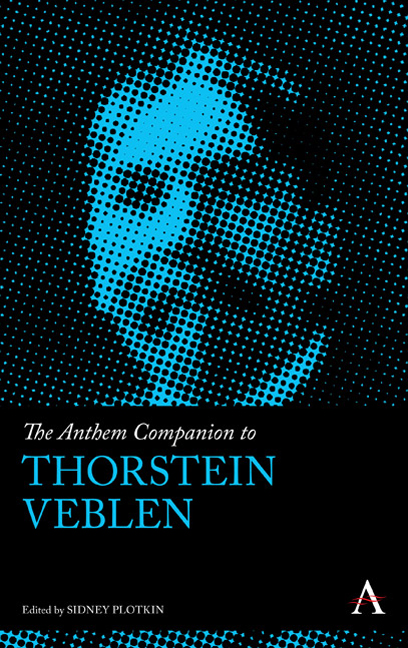Book contents
- Frontmatter
- Dedication
- Contents
- Acknowledgments
- Introduction: Thorstein Veblen's Elusive Project
- Part I METHOD, PHILOSOPHY AND VALUES
- Contents
- Part II CAPITALISM, SOCIAL STRUCTURE AND POLITICS
- Chapter Six Reigniting the Anthropology of Capitalism: Returning to Veblen, after Postmodernism, after Postcoloniality
- Chapter Seven On the Social Origin of the Leisure Class in Turkey: For a Veblenian Turn in the Marxian Research Program of Turkish Studies
- Chapter Eight Veblen's Localism and Its Ambiguities
- Chapter Nine Learning from Veblen's Masterless Man for Grassroots Democratic Change
- List of Contributors
- Index
Chapter Eight - Veblen's Localism and Its Ambiguities
from Part II - CAPITALISM, SOCIAL STRUCTURE AND POLITICS
Published online by Cambridge University Press: 10 January 2018
- Frontmatter
- Dedication
- Contents
- Acknowledgments
- Introduction: Thorstein Veblen's Elusive Project
- Part I METHOD, PHILOSOPHY AND VALUES
- Contents
- Part II CAPITALISM, SOCIAL STRUCTURE AND POLITICS
- Chapter Six Reigniting the Anthropology of Capitalism: Returning to Veblen, after Postmodernism, after Postcoloniality
- Chapter Seven On the Social Origin of the Leisure Class in Turkey: For a Veblenian Turn in the Marxian Research Program of Turkish Studies
- Chapter Eight Veblen's Localism and Its Ambiguities
- Chapter Nine Learning from Veblen's Masterless Man for Grassroots Democratic Change
- List of Contributors
- Index
Summary
Rarely was Thorstein Veblen more caustic than in his late- career caricature of flimflam in America's country towns (1915, 332– 340; 1923, 142– 165). But this was by no means his only commentary on the local. Years earlier he had distinguished the “conspicuous consumption” of urban populations, whose anonymity raised stakes for people anxious to contrive efficient and potent means of display (1899, 86– 91). In these texts Veblen emphasized the local as a site of exploit. They typified his critiques of repressive emulation and financial speculation. But such examples are, in another sense, actually outliers. Veblen usually described local settings as places where his preferred industrial, pacific and humane values prevailed. Within primitive savagery, pagan anarchy and the handicraft era, Veblen's depictions of communal life and work exemplify an attractive humane localism. In these settings where predation slackened, we see glimmers of Veblen's industrial republic. Instead of pomposity, vainglory and hypocrisy, we find rough approximations of an “unsanctified arrangement […] of industrial ways and means” (1923, 28). Habits of local workmanship enabled people to experience direct self- government on the tolerant basis of live and let live.
Veblen treated the local as a cultural metric. Taking his observations as a larger whole, we can see a characteristic equivocation or duality in Veblen's thinking about the local. In most instances the local reflects wider patterns of systemic predation. But even here, the country town is different. As a local form the country town does not so much reflect as it engenders and radiates predatory values out onto the larger American pecuniary culture. In this special case, the local itself sets “the tone or bias” that “runs through the whole” (Veblen, 1914, 177). But as indicated above, Veblen also— indeed more often— envisioned local places as sites of labor, peace and democracy. These examples are important. They nudge us a little closer to Veblen's sense of an ideal republic. More, they suggest that perhaps the industrial republic is best seen not as a single industrial system but as a diverse plurality of smaller industrial communities, loosely bound together in some kind of federal arrangement. This is a tentative conclusion but a supportable one, I believe. But whether or not one accepts this conclusion, Veblen's localism deserves study for the ambiguities and patterns it reveals in his social and political thought.
- Type
- Chapter
- Information
- The Anthem Companion to Thorstein Veblen , pp. 213 - 236Publisher: Anthem PressPrint publication year: 2017



